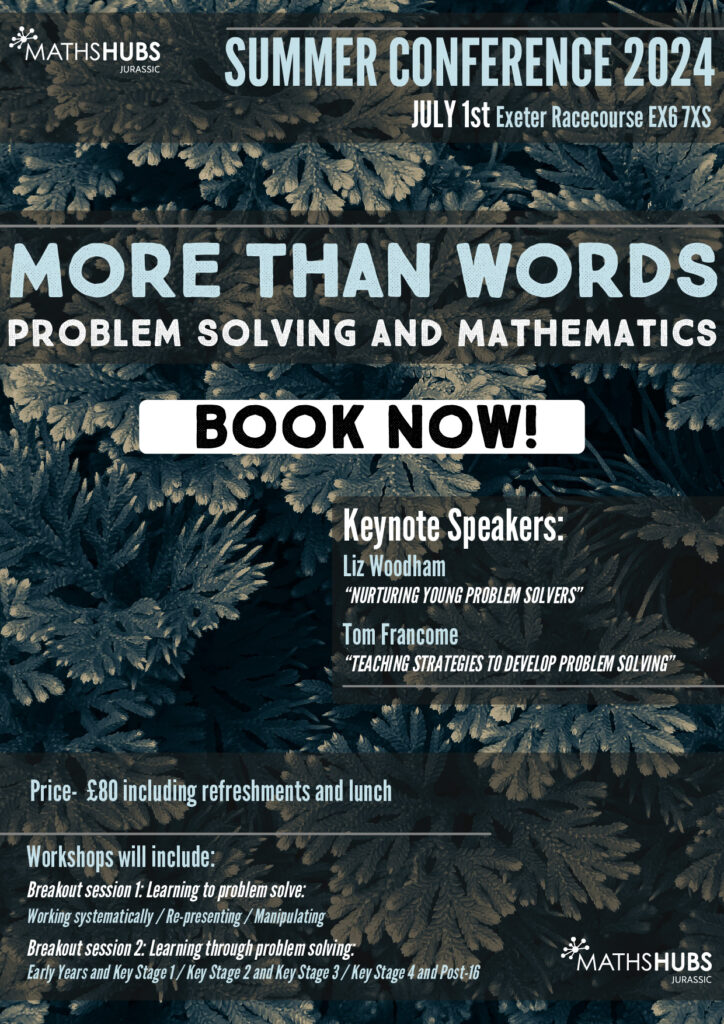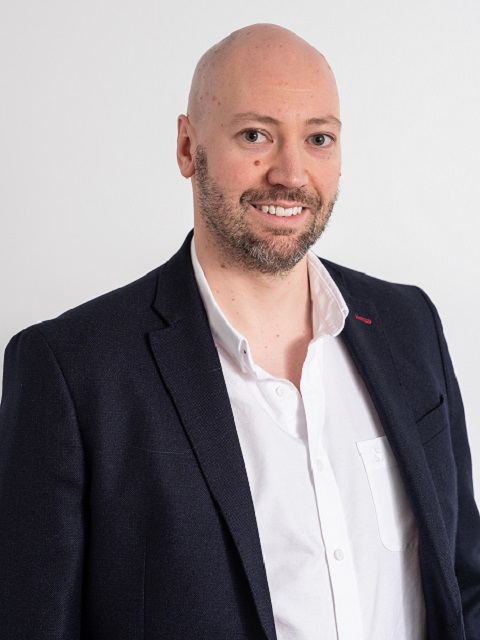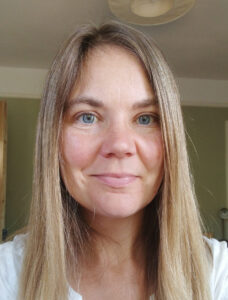Booking is now closed.
More than Words…..
It is a pleasure to once again host our annual Jurassic Maths Hub Conference. This year’s Conference is titled ‘More than Words’ Problem Solving and Mathematics. The Conference will offer the chance to explore learning ‘to’ problem solve as well as learning ‘through’ problem solving. With two Key Note speakers, Tom Francome and Liz Woodham who will both look at key ideas in this theme.
BOOKING CLOSES 26 JUNE 2024

The 2024 conference will take place on the 1st of July at Exeter Racecourse. The event will start at 10am, with arrivals welcome from 9.30. We are offering places on a first come first served basis. Ticket price £80, to include refreshments and lunch.
Delegates will also have the opportunity to win a pair of race day tickets, donated by the venue, to attend their Devon Air Ambulance Race Day on the 24th November.
Agenda
- 09.30 am Arrival and Registration (with tea and coffee)
- 10.00 am Welcome by Adam Shelley Strategic Board Chair
- 10.10 am Maths Hub Teaching for Mastery Statement
- 10.25 am Tom Francome Keynote Speaker 1
- 11.25 am Break
- 11.40 am Breakout Session 1
- 12.25 pm Movement time and comfort break
- 12.30 pm Jurassic Maths Hub Session – Led by Ruth Trundley and Phil Eadie
- 13.10 pm Lunch
- 13.55 pm Breakout Session 2
- 14.40 pm Movement time and comfort break
- 14.45 pm Liz Woodham Keynote Speaker 2
- 15.45 pm Plenary
- 15.50 pm Close
The Conference is an opportunity for teachers and leaders of Mathematics at all phases from EYFS through to Post 16 to work collaboratively. We aim to provide space for educators to think mathematically and reflect on their role as professional development leads of mathematics and as classroom practitioners. This year our focus is on problem solving, which builds on previous Hub work on developing mathematical Oracy. The Conference will offer the chance to explore learning ‘to’ problem solve as well as learning ‘through’ problem solving. Participants will work in cross phase groups and then phase specific groups to explore some of the strategies used to solve problems and to reflect on the learning through problem-solving. Participants will experience these approaches and think about implications for teaching these strategies in the classroom.
Key Note Speakers:
Teaching Strategies to Develop Problem Solving (and Teaching Strategies to Develop Problem Solving).
It is widely acknowledged that the purpose of mathematics is to solve problems. But what do we know about how to support learners in developing their problem solving? We know fluency with skills like multiplication, is necessary but not sufficient. What more is needed if we think of a problem as being something you don’t know how to solve in advance? How can we teach problem solving without giving the game away or just hoping for the best? In this active session, we will explore some problem-solving contexts to consider teaching strategies to improve problem solving in two ways: strategies for teachers and teaching topic-specific strategies for learners.

Tom Francome
Biography
Tom is a Senior Fellow in the Centre for Mathematical Cognition in Loughborough University’s Department of Mathematics Education. Tom taught mathematics in schools and worked for many years as a Head of Mathematics and Head of Faculty. He established an innovative approach with his department, built on the philosophy that every pupil can develop as a mathematician through sensitive teaching, collective effort, and rich mathematical experiences. Tom’s approach was recognised nationally when his department won the TES Award for ‘Maths Team of the Year 2015’. Tom was previously a lecturer in secondary mathematics education at the University of Birmingham. He now heads up the mathematics PGCE at Loughborough, and his wider role in the Centre is to work to integrate basic research, academic scholarship, and practical experience. Tom’s recent research centres on the nature of practising in mathematics and developing the mathematician as well as the mathematics through the curriculum.
Nurturing Young Problem Solvers
Problem solving is at the heart of mathematics, so how can we support learners to become better problem solvers? In this session, we will focus on some key considerations and ways in which NRICH can help, as we do some mathematics together.
Liz Woodham

Biography
Liz was a primary school teacher in north London before joining the NRICH team. Liz’s role as Primary Coordinator involves working as part of a team to develop primary-level materials for the website and to run associated teacher professional development. Liz is a member of the joint MA ATM primary expert group.
Breakout Sessions:
Please bring a fully charged laptop (not smartphone) to use during these sessions.
Breakout session 1: Learning to problem solve:
These cross phase breakout sessions will explore how teachers can support pupils to develop problem solving skills.
Delegates will be able to choose from three Workshops:
- Working systematically
- Manipulating
- Re-presenting
Breakout session 2: Learning through problem solving:
These phase specific breakout sessions will explore how pupils can develop their conceptual understanding through solving problems.
Delegates should choose the phase relevant to them:
- Early Years and Key Stage 1
- Key Stage 2 and Key Stage 3
- Key Stage 4 and Post-16

